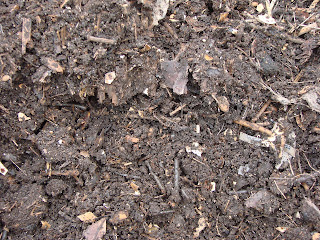
We are interested in the compostability of nappies (well, in compostability generally - see 20/3/07). This is the latest bulletin from the front. I had to empty one of the bins the other day and some nasties were revealed.
First, above, what it should look like: rich, friable, odourless brown stuff with a few eggshells, chicken bones and twigs (and, this being more than a year old, teabags - see 22/6/07).
 But lurking in the well-composted material was a large number of completely uncomposted Moltex nappies which had been put in last September, i.e. fourteen months ago, in the belief that they were biodegradable. So why did we think that they would compost?
But lurking in the well-composted material was a large number of completely uncomposted Moltex nappies which had been put in last September, i.e. fourteen months ago, in the belief that they were biodegradable. So why did we think that they would compost?I don't know of any claim that Moltex nappies are wholly or largely biodegradable, but there is a very clear one they will be broken down in few weeks by worms, and a cool compost bin normally functions as a wormery. The claim appears, for example, at naturebotts.co.uk,
"· NEW breathable backsheet which is 100% biodegradable · Compostable - proven to break down within 8 weeks in a wormery - tests carried out by ecobaby in Ireland, visit www.ecobaby.ie for further information". Here and elsewhere one receives a strong impression of at least partial compostability.
In fourteen months I really would have expected some sign of deterioration. After all, it is not as though the thing is sealed. The outside is polythene or polypropylene and so quite un-biodegradable. But the little bundle is only closed with Velcro, and then the whole point of the inside surface is that it is permeable. Nonetheless the nappies are still heavy and rubbery with no sign at all of biodegradation. I suspect that the problem is the gel, the super-absorbent polymer that is used in such quantity in Pampers and the like. No claim for biodegradability has ever been made for it, but it seems as though it acts as a barrier to microbial attack, so that cellulose (i.e. the wood pulp in the middle of the nappy) impregnated with gel will no longer decompose in the way one would otherwise expect. In brief, thumbs down to Moltex.
